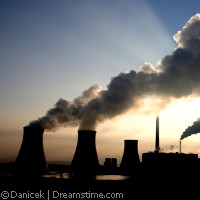CO2 emissions up, carbon sinks weakening - is Earth's carbon budget in the red?
Carbon dioxide (CO2) emissions from fossil fuels have risen by 29% since 2000, and a growing body of evidence suggests that the ability of natural carbon sinks to absorb these emissions may be dwindling. These are just two of the main findings from a major international effort to calculate the Earth's 'carbon budget'. The study, which is published online by the journal Nature Geoscience, was partly supported by the EU through the CARBOOCEAN ('Marine carbon sources and sinks assessment') project, which received EUR 14.5 million from the 'Sustainable development, global change and ecosystems' Thematic area of the Sixth Framework Programme (FP6). According to the researchers, atmospheric CO2 levels rose by 1.8 ppm (parts per million) in 2008, bringing total CO2 levels to 385 ppm. This is 38% higher than the pre-industrial CO2 levels of around 280 ppm. In fact, atmospheric CO2 levels are now higher than at any other time during the past 2 million years. The bulk of this rise in emissions can be attributed to the burning of fossil fuels such as coal, oil and gas. Fossil fuel emissions have risen by 29% since 2000, and 41% since 1990, the reference year for the Kyoto Protocol. Furthermore, while CO2 emissions from fossil fuels rose by just 1% per year during the 1990s, they rose by an average of 3.6% per year between 2000 and 2007. The economic crisis helped to slow the rise in emissions; in 2008, they 'only' increased by 2%. Nevertheless, the researchers warn, 'emissions continued to track the average of the most carbon-intensive family of scenarios put forward by the Intergovernmental Panel on Climate Change'. Looking at expected changes in gross domestic product (GDP), the team expects emissions for 2009 to fall back to 2007 levels, before rising again in 2011. So what is driving this rise in emissions? A major culprit is coal, which has now overtaken oil as the dominant fossil fuel emission source. Coal was responsible for 40% of all fossil fuel CO2 emissions in 2008, compared to 37% for the period from 1990 to 2000. In contrast, oil's contribution to total fossil fuel emissions fell from a high of 41% during the 1990s to 36% in 2008. While emissions from developed nations have remained relatively stable during the last decade, emissions from developing countries have risen sharply. However, around a quarter of this rise in emissions from developing countries is accounted for by the production of goods and services destined for consumption in developed countries. Furthermore, while developing countries are home to some 80% of the world's population, they account for just 20% of all the CO2 emitted since 1751. Emissions from land use change such as deforestation and forest fires have changed little over the past decade. Because emissions from fossil fuel burning have risen, the proportion of total CO2 emissions released by land use change has fallen in recent years; in 2008, land use accounted for 12% of CO2 emissions. During the period from 1959 to 2008, natural carbon sinks removed an average of 57% of man-made CO2 emissions every year. However, there is evidence that the effectiveness of these sinks may be declining; 50 years ago the sinks absorbed 60% of our emissions, but in recent years this figure has fallen to around 55%. Computer models suggest that this weakening of the carbon sinks may itself be due to climate change. However, more research is urgently needed to better quantify where the carbon is going and what is driving changes in the strength of the carbon sinks. 'The only way to control climate change is through a drastic reduction in global CO2 emissions,' commented lead author Professor Corinne Le Quéré of the University of East Anglia, UK, and the British Antarctic Survey. 'The Earth's carbon sinks are complex and there are some gaps in our understanding, particularly our ability to link human-induced CO2 emissions to atmospheric CO2 concentrations on a year-to-year basis. But, if we can reduce the uncertainty about the carbon sinks, our data could be used to verify the effectiveness of climate mitigation policies.' Meanwhile, the researchers conclude by warning that 'the key to sustained emissions reductions after the global economy recovers lies in restructuring the primary energy use to decouple emissions from GDP'. Scientists working on the CARBOOCEAN project recently called for more ambitious carbon dioxide reduction targets.



